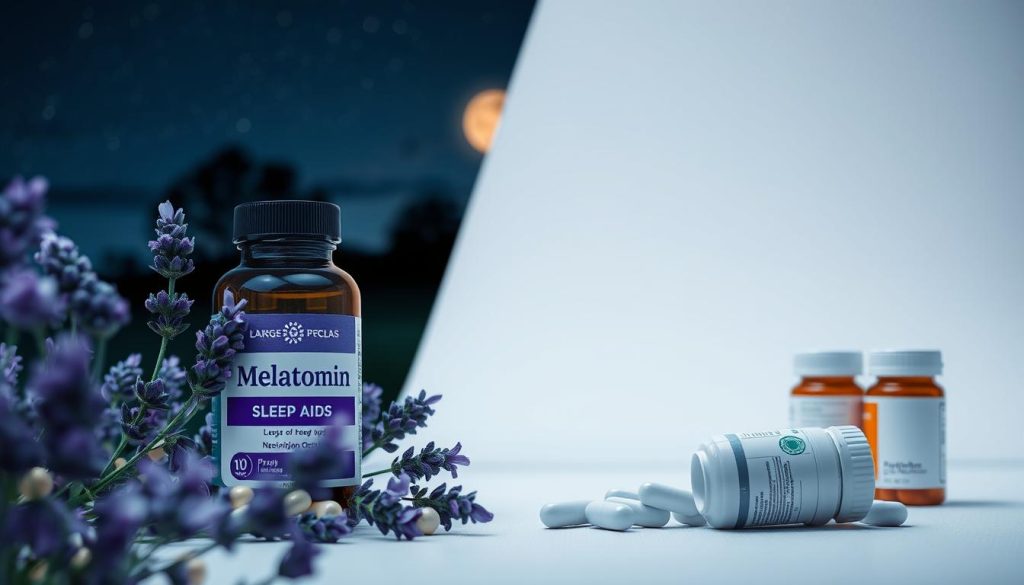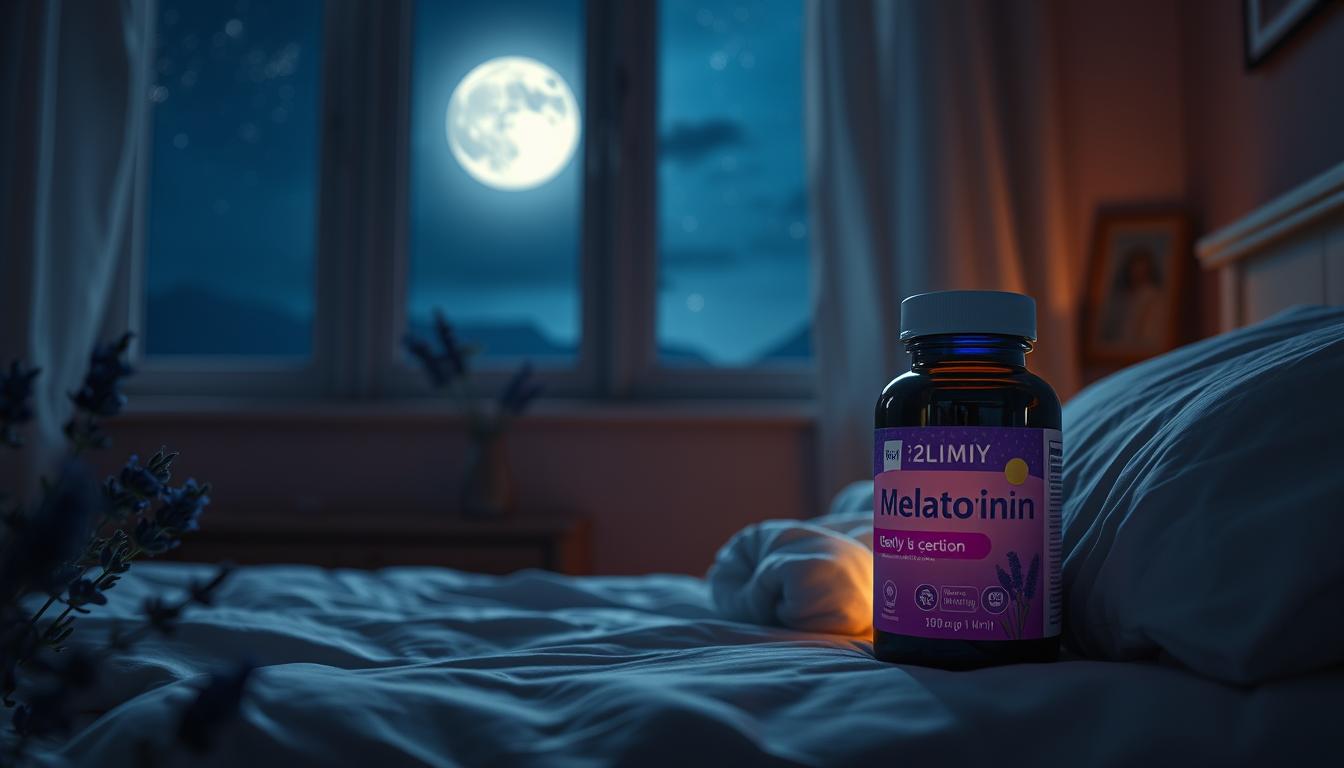Melatonin is a hormone our bodies make. It helps us sleep and wake up. It’s a natural way to get better sleep and fight insomnia.
We’ll look at how melatonin works and how to use it. It’s a safe and effective way to sleep better.
Understanding Melatonin: Nature’s Sleep Regulator
Melatonin is a hormone that helps us sleep and wake up. It’s made by the pineal gland in our brain. Its production is tied to our body’s internal clock.
What is Melatonin?
Melatonin is called the “sleep hormone.” Its levels go up at night and down in the morning. This helps us feel sleepy at night and awake in the day.
How Melatonin Regulates Sleep-Wake Cycles
Melatonin helps our body’s clock match the outside world. It responds to light and dark. When it’s dark, we feel sleepy. When it’s light, we wake up.
Knowing how melatonin works helps us improve our sleep. It’s key to a good circadian rhythm and quality sleep.

Benefits of Melatonin for Improving Sleep Quality
Melatonin is a hormone in our bodies that helps us sleep better. It makes falling asleep faster and sleeping longer. This supplement can greatly improve our sleep quality.
Melatonin is great for managing sleep problems like jet lag and insomnia. It helps our body’s clock work better. This leads to more restful sleep and waking up feeling good.
If you sometimes have trouble sleeping, melatonin can help. Research shows it can:
- Make falling asleep 12 minutes faster
- Make you sleep 13 minutes longer
- Make your sleep better, so you feel more rested
Melatonin can improve our health by helping us sleep better. It’s a natural way to fight insomnia or just make your sleep better. Adding melatonin to your routine might be a smart choice.

Melatonin: A Safe and Natural Alternative to Prescription Sleep Aids
Many people are choosing melatonin over prescription sleep aids to improve sleep. Melatonin is seen as safer and more natural. It doesn’t have the risks of dependency or drowsiness that some medicines do.
Potential Side Effects and Precautions
Melatonin is usually safe, but some side effects can happen. These include feeling sleepy during the day, headaches, or stomach issues. It might also affect how some medicines work, like blood thinners or diabetes meds.
To avoid side effects, start with a small dose of melatonin. Then, you can slowly increase it if needed. Always talk to a doctor, especially if you’re on other medicines or have health issues.
| Melatonin | Prescription Sleep Aids |
|---|---|
| Natural sleep regulator produced by the body | Synthetic, pharmaceutical sleep medications |
| Generally well-tolerated with few side effects | May cause dependency, next-day drowsiness, and other side effects |
| Non-addictive and non-habit forming | Can be habit-forming and lead to dependence |
| Supports the body’s natural sleep-wake cycle | May disrupt the body’s natural sleep patterns |
Knowing about melatonin’s side effects and precautions helps you decide if it’s right for you. This is especially true when compared to prescription sleep aids.

Optimal Dosage and Timing for Taking Melatonin Supplements
Finding the right melatonin dosage and timing is key for better sleep. The right amount can change based on age, sleep needs, and sleep issues. Knowing these can help you pick the best melatonin for you.
Factors Affecting Melatonin Effectiveness
Several things can change how well melatonin works. These include:
- Exposure to blue light, which can lower natural melatonin
- Stress levels, as high stress can mess with sleep rhythms
- Certain medications, which may not work well with melatonin
Being aware of these can help you adjust your melatonin use and sleep space for better results.
| Factor | Impact on Melatonin |
|---|---|
| Blue Light Exposure | Suppresses natural melatonin production, reducing effectiveness of supplements |
| Stress Levels | High stress can disrupt the body’s circadian rhythms and melatonin regulation |
| Medications | Certain drugs may interact with melatonin supplements, altering their effectiveness |
By knowing these factors and making changes, you can find the best melatonin for better sleep and health.
Incorporating Melatonin into a Healthy Sleep Routine
To get the most from melatonin, add it to a healthy sleep plan. Mix melatonin with lifestyle changes for better sleep. This way, you’ll improve your sleep quality and how long you sleep.
Sleep Hygiene Tips to Enhance Melatonin’s Effects
Here are some sleep tips to boost your melatonin routine:
- Stick to a sleep schedule every day, even on weekends, to keep your body clock in sync.
- Make your bedroom cool, dark, and quiet for a relaxing sleep space.
- Stay away from blue light from screens for 1-2 hours before bed.
- Do calming things before bed, like reading, taking a warm bath, or meditating.
- Don’t eat heavy meals or drink caffeine or nicotine close to bedtime.
| Sleep Hygiene Tip | Benefit |
|---|---|
| Consistent Sleep Schedule | Regulates the body’s internal clock, improving melatonin production and sleep-wake cycles. |
| Relaxing Bedtime Environment | Minimizes distractions and promotes better sleep quality. |
| Limit Blue Light Exposure | Prevents disruption of the body’s natural melatonin production. |
| Relaxing Pre-Bed Activities | Helps the body and mind transition into a state of rest and relaxation. |
| Avoid Stimulants Before Bed | Ensures the body is not artificially stimulated, allowing melatonin to work effectively. |
By following these tips, you can make your melatonin work better. Enjoy better sleep quality and longer sleep times.
Exploring Other Natural Sleep Aids Alongside Melatonin
Melatonin is a great natural sleep aid, but it’s not the only one. We can try other natural supplements and herbs with melatonin for better sleep. Valerian root, chamomile, and magnesium are some good choices.
Valerian root helps us relax and fall asleep quickly. Chamomile makes us feel calm, helping us sleep better. Magnesium helps control our sleep-wake cycles.
Using these natural sleep aids with melatonin can make a big difference. This approach helps us find the best way to sleep well. We wake up feeling refreshed and ready for the day.

